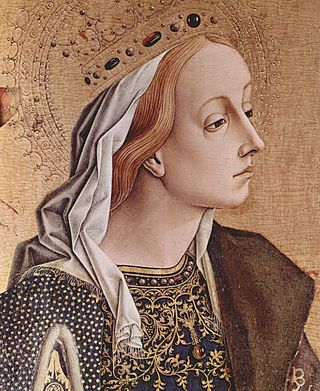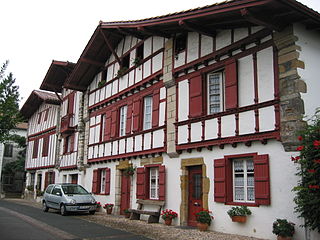
Stephen or Steven is a common English first name. It is particularly significant to Christians, as it belonged to Saint Stephen, an early disciple and deacon who, according to the Book of Acts, was stoned to death; he is widely regarded as the first martyr of the Christian Church.

A unisex name is a given name that is not gender-specific. Unisex names are common in the English-speaking world, especially in the United States. By contrast, some countries have laws preventing unisex names, requiring parents to give their children sex-specific names. In other countries or cultures, social norms oppose such names and transgressions may result in discrimination, ridicule, and psychological abuse.
Spanish names are the traditional way of identifying, and the official way of registering, a person in Spain. They are composed of a given name and two surnames. Traditionally, the first surname is the father's first surname, and the second is the mother's first surname. Since 1999, the order of the surnames in a family in Spain is decided when registering the first child, but the traditional order is nearly universally chosen.

Basque pelota is the name for a variety of court sports played with a ball using one's hand, a racket, a wooden bat or a basket, against a wall or, more traditionally, with two teams face to face separated by a line on the ground or a net. The roots of this class of games can be traced to the Greek and other ancient cultures.

Akelarre is the Basque term meaning Witches' Sabbath. Akerra means male goat in the Basque language. Witches' sabbaths were envisioned as presided over by a goat.

Markina-Xemein is a town and municipality located in the province of Biscay, Bizkaia, in the Basque Autonomous Community, also known as the Basque Country, located in northern Spain. The origin of the town's name lies in its geographic location. The last town in the province of Bizkaia, Markina-Xemein lies between Gipuzkoa and Bizkaia. Coming from the Spanish word "marca" meaning "mark", Markina-Xemein marks the location where the Gipuzkoanos often battled the Bizkainos.

Aldudes is a commune in the Pyrénées-Atlantiques department in the Nouvelle-Aquitaine region in southwestern France.
Lope is an old given name of Basque, Gascon and Spanish origin, derived from Latin lupus, meaning "wolf". Lope may refer to:
Ochoa is a Spanish surname of Basque origin common throughout Spain, France, the Americas, and the Philippines. It is a surname of patronymic origin; it was originally a given name in Medieval Spain.

The Duchy of Gascony or Duchy of Vasconia was a duchy located in present-day southwestern France and northeastern Spain, an area encompassing the modern region of Gascony. The Duchy of Gascony, then known as Wasconia, was originally a Frankish march formed to hold sway over the Basques. However, the duchy went through different periods, from its early years with its distinctively Basque element to the merger in personal union with the Duchy of Aquitaine to the later period as a dependency of the Plantagenet kings of England.

Katherine, also spelled Catherine and other variations, is a feminine given name. The name and its variants are popular in countries where large Christian populations exist, because of its associations with one of the earliest Christian saints, Catherine of Alexandria.

Basque surnames are surnames with Basque-language origins or a long, identifiable tradition in the Basque Country. They can be divided into two main types, patronymic and non-patronymic.

Núria is a Catalan girls' name taken from the Virgin of Núria, a Marian shrine located in the eponymous valley, the Vall de Núria. The name also occurs in Spanish without the accent as Nuria, given that the Spanish name of the valley is el valle de Nuria.
Amaya is a female given name and surname of Spanish, Japanese, and Arabic origins, derived from the village of Amaya and its neighboring mountain in Castile and León, Spain. The name of the village, in turn, has Indo-European roots and means "am (ma)" or "mother". The suffix io-ia is also used to form action names or toponyms, implying that the meaning of Amaya or Amaia is "mother city", as it will be called later, "the capital". Other hypothesis is that the name derived from the Proto-Basque or Basque word Amaia, meaning "the end". Variations include Amaia, Amayah, Ammaya, and Amya.

Amaia Zubiria is a Spanish-Basque singer who was born in Usurbil in the Basque province of Gipuzkoa. She started singing with Txomin Artola with whom she formed the Haizea band. She toured the Basque Country, singing adaptations of the local folk songs. She has recorded several albums since 1985, some with other singers such as Pascal Gaigne, some as a soloist.
Ximena or Jimena is the female version of the given name Jimeno or Ximeno, a Spanish or Basque name of unknown meaning that has been in use since the Middle Ages. It has been associated with the Basque Semen. It has come to be viewed as a form of the name Simone, though their origins are distinct. The French rendering of the name is Chimène.
Irati ( IRA-tee is a Basque feminine given name meaning “fern field”. It was among the ten most popular names given to newborn girls in the Basque community in Spain in 2021.
Txomin is a Basque translation of the name Dominic.